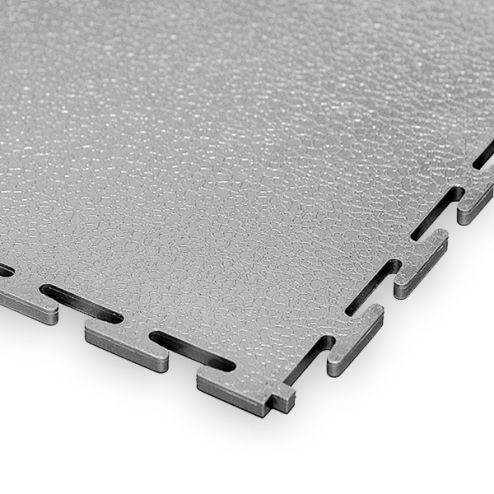Do I have to prepare the floor in any way?
The tiles cover a wide range of floors very successfully with very little preparation. Considering a typical garage floor, simply sweep up to remove excess dust and debris and you can start laying the tiles. They will successfully cover a coarsely tamped concrete floor and conform to undulations. You may need to chip off any high or sharp spots before laying.
If there are step changes in the floor then the tiles should successfully lie over anything up to 10mm change. However, for anything over that, then you should consider cutting the tiles up to the step.
Can the tiles be cut?
The tiles can be cut with typical woodworking tools. Though a hand-held electric jig saw is the best option. The tiles are tolerant to being cut with any blade though a coarse wood-cutting blade works the best. It is good practice to cut the tiles to within 5mm of any fixed point such as walls and pillars.
Can I use car jacks and trolleys on the tiles?
Yes. They are very dense and durable. Should a car be left on jacks for some days, then when the point loads are removed you may see very shallow indentations. However these will recover to level over a few hours or days depending upon the ambient temperature.
Can I lay the tiles myself?
Yes, they are well within the scope of a DIY job and are easily laid with a little forethought and planning. However, we do offer an installation service if required.
What is the optimum thickness?
Based upon our extensive experience, we believe that 7mm of solid PVC provides the optimum for a residential garage, commercial garage or warehouse.
Please note these are true thicknesses. Many alternative products have a very deep grid pattern beneath that reduces their effective thickness and load-carrying capacity considerably.
Do I need to bond the tiles to the floor?
In most of cases, no bonding is required. Being manufactured of high density PVC, the tiles weigh around 9kg per square metre and happily lie flat under gravity. However, if your garage is south-facing, and you intend to leave the doors open on hot summer days, then the tiles will heat up and expand pushing against each other with a tendency to rise at the joints, or in the centre of the tiles, typically by 5-15mm. You should consider bonding the rows of tiles in the areas where the sunlight will strike. We can suggest a suitable two-pack bonding material if required.
This type of expansion only occurs when they are heated by direct sunlight. Sunlight entering through windows can also have the same effect, so a blind or similar window protection should be utilised.
Do tyres mark the tiles?
Rubber tyres tend to mark almost every type of floor including bare concrete, painted, epoxy and vinyl flooring.
Tyre marks are far less obvious in the darker tile colours and is almost indistinguishable from the colour of our graphite and black tiles. If you wish to use the lighter coloured tiles to brighten up the garage or workshop design the floor in a layout that uses the darker coloured tiles where the vehicle will be parked.
The following tips may be of help:
- Tile the whole floor in graphite (a very stylish looking tile) or black.
- Use black, graphite or dark grey tiles where tyres will sit.
- Place strips of black, graphite or dark grey tiles where the tyres rest.
The stain is a chemical reaction and will not damage the tiles or affect their durability.
Where are your tiles manufactured?
They are manufactured for us in the UK and despatched nationally using next day parcel or pallet delivery services depending upon the size of the order.
Why should I go for the extra cost of virgin PVC tiles?
Interlocking PVC tiles are intended to provide a long-term solution. So virgin PVC using uncontaminated raw materials offers the greatest stability from deformation, discolouring and absorption of fluids. It also offers the best surface appearance by far for a pleasing finish.
If you cut recycled tiles you will find them to be made up of small particles of multiple plastics, including electrical wiring, that don’t bond together too well. They can have a strong odour. They also contain bulking agents such as chalk and clay that can absorb oil, petrol and even water over time causing unsightly expansion especially at the corners. Virgin PVC is totally stable and non-absorbent.
At the end of the life of our tiles (20 years+), we can arrange for the tiles to be returned to the manufacturer to be recycled.
Can I lay the tiles onto a heated garage floor?
Yes, but the tiles need to be spread out in small piles with the floor turned on, and then laid whilst warm.
Will water get beneath the tiles?
Rain water may be pulled beneath the tiles if the bottom of the garage door isn’t sealed. This can be reduced by running a silicon bead or two beneath the full length of the front end of the tiles or ramps.
If water runs off a car and forms a puddle, then a little may be pulled beneath the tiles by capillary action through the joints, but it will also evaporate through the same route.
Any water beneath the tiles does not affect them, and virgin PVC has a natural biocidal characteristic that resists mould growth and unpleasant smells.



